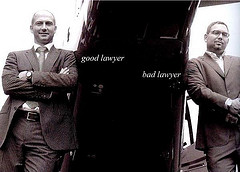
This is part of my Series on Entrepreneurial Culture.
I mentioned in an earlier post that I’d eventually share my thoughts about what qualities I think make certain entrepreneurs more successful than others. For me, this isn’t just idle philosophizing. When I invest in companies as an angel, or when I entrust a university spin-off to the hands of an entrepreneur, character judgment has concrete, real world consequences.
Over the years I’ve picked-up on a few key qualities that most successful entrepreneurs possess. Below are the five such qualities I’ve identified. Keep in mind that these qualities are interrelated.
Extreme Focus & Big Energy:
Laid-back people, folks who are easily distracted and/or disorganized do not make good entrepreneurs. Those I’ve met who drive businesses to great achievement all possess a single-minded relentlessness and intensity. At times this dedication and energy can border on what mainstream society considers “unhealthy”, but I think this trait is probably required, for better or for worse.
Ability to Do What It Takes and Multi-Task:
Have you met folks who mention in an off-hand way that “I don’t answer emails at night or on weekends”? Or have you met folks who tell you that “people exhaust me”. How about this one: “I’m good when you give me one thing to do but don’t send me a bunch of stuff at once”. They may be wonderful people, but rest assured, they are not destined to be successful entrepreneurs. Entrepreneurs who excel always do “what it takes” and always make the extra effort. They can handle multiple tasks on a given day often in an atmosphere of great uncertainty. Perhaps most importantly they can deal with all sorts of personality types and don’t spend psychic energy complaining about how much they dislike so-and-so.
Self-Confidence and Flexibility:
Launching oneself into the realm of the unknown takes a great deal of self-confidence. It presumes that such a person feels he or she is equipped to successfully deal with whatever is thrown their way. New ventures are all about being prepared to address the unexpected obstacles and bad news with which you will inevitably be confronted. Generals say that the battle plan lasts as long as the first engagement with the enemy occurs. Mike Tyson famously said that his opponents’ strategy coming into the ring with him lasted up to point when they first received his fist smashing into their faces. The same is true for start-ups. It’s a game for confident people who can deal with reality. They have to be confident and flexible enough to change their plans and adjust their expectations based on the feedback their business receives where the rubber meets the road.
Communication Skills:
This particular skill is not necessarily required depending on the type of business you have. In the world of consumer internet companies, for example, there are plenty of ultra socially awkward entrepreneurs like Markus Frind (Plenty of Fish) and Tony Hsieh (Zappos) who are well known for their shy and retiring demeanor. However, in the case of both of these gentlemen, it would be hard to find other human beings on this earth who are more driven than they are. (Here’s Markus describing his own killer-instincts and relentnessness: http://bit.ly/4AZDu)
In businesses that require interacting with other human beings in the non-virtual environment, however, I do believe that strong communication skills are a pre-requisite for being a good leader. You need to convince talented people to work with you and you need customers and investors to want to do business with you. Articulate, clear-minded people have a huge advantage over other entrepreneurs who lack these skills.
Enlightened Stubborness:
This is perhaps the most elusive one of all. On one hand I actually do think great entrepreneurs are stubborn. They are stubborn in the sense that when they first struck out on their own they faced down all the people who doubted them and told them not to do it and not to stray from the primrose path of job security. They are stubborn in the sense that when certain people or certain old ways of doing things get in the way of their innovative businesses, they persist and overcome this resistance. And they are stubborn to the core when customers first tell them “No” and when competitors come after them with a vengeance.
So where’s the enlightened part? Well, although I have not actually met someone with this quality in the real world, I believe that the ideal entrepreneur would have an almost preternatural self-awareness lurking inside them amidst all this primitive stubborness. For example, they would have a sixth sense about when things just aren’t working and are flexible and confident enough to change plans. They would seem to know just when they’ve reached the point at which they’ve built the business up to the highest level they were capable of and are suddenly willing to step-aside for a manager with the right management skills to help take the company to the next level. Lastly, they would have the capacity to really listen to respected advisors and to take advice without bristling.
The reality is that no one person has all five of these qualities in abundance. And if they do, they’d probably have a bunch of other foibles that would diminish the effectiveness of the ones I’ve mentioned above. Integrity, for example, is of paramount importance and the absence of it has been the Achilles heel for a lot of talented entrepreneurs. My points above should thus be taken for what they are- a general guide born of my own experience and not some kind of definitive checklist. Ultimately we all use our own judgment about the entrepreneurs with whom we partner or in whom we invest.
For my video conversations with great entrepreneurs: Venture Studio
For my ongoing Series on Entrepreneurial Culture: Entrepreneurial Culture


![Reblog this post [with Zemanta]](http://img.zemanta.com/reblog_e.png?x-id=a20cb29e-3e8f-444e-af50-2f31b291ecec)


![Reblog this post [with Zemanta]](http://img.zemanta.com/reblog_e.png?x-id=32984989-2bb2-48c2-b7bf-af9642d55d00)

![Reblog this post [with Zemanta]](http://img.zemanta.com/reblog_e.png?x-id=63a60ab3-e708-4123-83b3-60bbbd15e840)

![Reblog this post [with Zemanta]](http://img.zemanta.com/reblog_e.png?x-id=e0d938e5-b776-446a-a18b-d58564d82187)
![Reblog this post [with Zemanta]](http://img.zemanta.com/reblog_e.png?x-id=be6830fd-1bc3-4abc-b48c-27777be61f1a)

![Reblog this post [with Zemanta]](http://img.zemanta.com/reblog_e.png?x-id=6066e92b-d349-43ee-9a25-0ffe5b1d93a8)

![Reblog this post [with Zemanta]](http://img.zemanta.com/reblog_e.png?x-id=c73e7729-f742-41de-ae53-2793ca169988)
![Reblog this post [with Zemanta]](http://img.zemanta.com/reblog_e.png?x-id=128cb0f9-5618-46e5-a05a-dd0d36c873ed)
![Reblog this post [with Zemanta]](http://img.zemanta.com/reblog_e.png?x-id=47f10be9-ab95-469e-a28c-05597c2ce313)
![Reblog this post [with Zemanta]](http://img.zemanta.com/reblog_e.png?x-id=2cbf0379-7ea4-46a8-9ba4-6fec054b2a0b)
